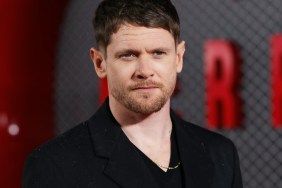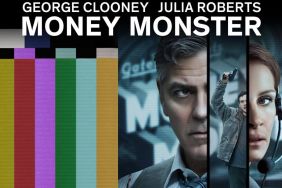
6 out of 10
Cast:
George Clooney as Lee Gates
Julia Roberts as Patty Fenn
Jack O’Connell as Kyle Budwell
Dominic West as Walt Camby
Caitriona Balfe as Diane Lester
Giancarlo Esposito as Captain Powell
Christopher Denham as Ron Sprecher
Lenny Venito as Lenny
Chris Bauer as Lt. Nelson
Dennis Boutsikaris as Avery Goodloe CFO
Emily Meade as Molly
Condola Rashad as Bree
Aaron Yoo as Won Joon
Directed by Jodie Foster
Money Monster Review:
Movies about the economy are always hard sells. As detail-oriented as a film like The Big Short is, even that film admits that at some point, all the terminology and all the explanations of just how Wall Street does business becomes impossible to decipher and explain to the regular American outside of the system. The only option is for Hollywood to go broad, to make a movie like Inside Job into a heist film, or Trading Places or The Big Short into easily digestible comedies. Even Michael Moore’s polemics struggle with selling their viewpoints.
And while these films have noble intentions, in the end the delivery of all this financial information is extraneous to the intentions of the movie, which is first and foremost to entertain. This is complicated stuff, and certainly not easy to absorb in a two-hour movie; people with economics degrees would have a hard time explaining it to the layman without that person’s eyes glazing over. Hollywood also has a tendency to apply traditional morality to these stories, but find themselves guilty of the same hypocrisies they accuse Wall Street of. Financial movies normally have to be candy-coated so the medicine can go down easier, but judgment of the current economic system always rings a bit false, always feels a bit dishonest.
Money Monster, Jodie Foster’s fourth directorial film, means well. It tries to condense these complicated bits of information into an entertaining thriller. This is the kind of movie that dominated the summer landscape in the 1980s, before CGI, and George Clooney and Julia Roberts do a good job of juxtaposing the economics with the banter and the thrills. But when Money Monster is forced to make a moral choice, to take a stance, it feels crowd-pleasing but in no way does it feel true. Money Monster’s third act, especially, cannot sustain the energy and the smarts of the first two acts, and when these characters make the moral choices they make, they feel false and opportune for the moment. Their decisions lack moral weight, because we do not believe them.
Lee Gates (Clooney) is the star of FNN’s most popular financial news show, “Money Monster,” pimping stocks to the great unwashed masses watching on cable. His director Patty Fenn (Julia Roberts) is leaving the show after several years, exhausted by Gates’ antics and wants to get herself back to some real journalism if she can. One particular hedge fund that Gates recommended on his show suffered a “glitch” during computer high-speed training causing stockholders to lose over $800 million. But that doesn’t affect Gates one bit – he’s having too much fun on his show to care. When Kyle Budwell (Jack O’Connell), a disgruntled young man who lost several thousand dollars in that hedge fund glitch takes Gates and the station hostage, Gates and Fenn attempt to defuse the situation, while trying to track down the hedge fund’s elusive CEO Walter Camby (Dominic West).
The problem is that much of Money Monster feels disingenuous, and when the characters discover that it wasn’t just a simple glitch that cost all those millions of dollars, the film pretends to a moral authority that it simply doesn’t have. It is difficult to believe that an amoral character like Gates, who doesn’t care where his “news” comes from as long as people are watching him act up on national TV, has a moment of clarity. The nefarious dealings of Camby all feel just a bit too convenient, and the ethics that the movie wants to espouse feels dishonest. Money Monster wants to send the audience away on a “happy ending” high, but they deserve better than that – The Big Short’s refusal to dumb itself down is that film’s greatest strength, and forces us to work to understand the economic realities that we live in.
George Clooney and Julia Roberts give movie star performances and remind us why we enjoy watching them so much, even when their characters make choices that seem out of place. O’Connell plays his working-class loser almost as a caricature, going broad when he should be subtle, and he’s irritatingly one-note. The script, when not weighted with its false morality, has a snappy banter about it and at times is very funny, but when it attempts to explain the complexities of high finance is clumsy and ham-handed. It’s earnest when it should be biting, too eager for the expedient resolution when it should be more cynical and truthful. Jodie Foster handles the pace and the tension well enough – I admire that Money Monster does a lot with its 90 minutes – but plays the emotional beats too broadly and pulls back when the movie should push forward. Money Monster wants to have the weight of the conspiracy thrillers of the 1970s, but isn’t as brave or as honest.
Perhaps in ten years or so we’ll get the definitive film on the Great Recession – for now, The Big Short fills that slot well, and it’s fitting that Adam McKay told that story because of just how absurd things actually got. Jodie Foster is a good director, but Money Monster should have been far meaner and less eager to please the audience. It’s a summer movie, after all, and we want our escapism, even if it blinds us to the reality. Money Monster wants to have it both ways – it wants to expose the underbelly of high finance but it also wants to entertain without giving the audience too much to think about. The film picks the wrong side in that regard. We get that pat ending, everything is wrapped up in a bow, and we go home to our own economic realities, having learned very little. That is the real disservice, and a wasted opportunity.
Money Monster
-
Money Monster

-
Money Monster

-
Money Monster

-
Money Monster

-
Money Monster










